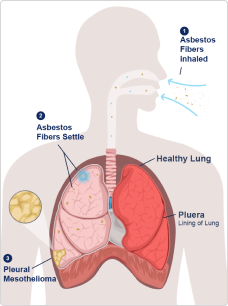Mesothelioma is a cancer caused by asbestos that forms in the lining of the lungs, abdomen, heart, or testicles. U.S. veterans account for one-third of all mesothelioma cases, as the military used asbestos for much of the 20th century. The Mesothelioma Veterans Center can help eligible veterans with mesothelioma access VA benefits, compensation, and treatments.
What Is Mesothelioma?
Malignant mesothelioma is a cancer that affects the mesothelium, the thin layer of tissue that covers internal organs. It develops after asbestos exposure.
U.S. veterans are at a high risk of mesothelioma cancer since asbestos was used by all military branches between the 1930s and early 1980s.
Quick Facts About Mesothelioma Cancer
- It takes 10-50 years for mesothelioma to appear after asbestos exposure.
- Roughly 1,000 veterans develop mesothelioma each year.
- The 5-year survival rate is 12%, but some patients have lived 20+ years with treatment.
- Veterans typically get $4,044.91 a month as of 2024 through mesothelioma disability payouts.
- The average mesothelioma lawsuit awards $1 million+ without involving the military.
The Mesothelioma Veterans Center can help you or a veteran you love get benefits from the U.S. Department of Veterans Affairs (VA). We may also be able to help you pursue additional compensation for treatments and other expenses.
Get our Free Veterans Packet now to see how we can assist you or a family member.
Mesothelioma Causes
The only known cause of mesothelioma is exposure to asbestos, a fibrous material once used in thousands of products like insulation, wires, and cables.
Here’s how asbestos causes mesothelioma cancer:
- When asbestos-containing products are handled or damaged, asbestos fibers can be released into the air.
- Anyone nearby may breathe in or swallow these fibers, which can get stuck in the linings of major organs and cause irritation.
- After 10-50 years, malignant mesothelioma cancer may develop.
Anyone who comes in contact with asbestos is at risk, though more exposure increases the odds of developing this cancer.
Why Veterans Are at Risk of Mesothelioma Cancer
U.S. veterans have a high risk of mesothelioma since all military branches used asbestos between the 1930s and early 1980s.
Asbestos was considered a safe way to keep bases and ships fireproof. Private manufacturers hid the risks from service members and the general public, putting profits ahead of human health.
Every branch of the military used asbestos, including the:
- U.S. Air Force: Planes and other aircraft used by the Air Force were built with asbestos-containing products to reduce the risk of fires.
- U.S. Army: The Army used tons of asbestos products in its bases and vehicles.
- U.S. Coast Guard: Thousands of Coast Guard ships were built with asbestos-based products for fireproofing and insulation
- U.S. Marine Corps: Marines may have been stationed on bases or ships that contained asbestos, which put them in danger of mesothelioma.
- U.S. Navy: There have been more mesothelioma cases in Navy veterans than in any other branch. All U.S. Navy ships used asbestos due to government mandates. Navy shipyard workers are at high risk as they worked with asbestos products daily.
“Asbestos didn’t kill anybody on the spot, that’s for sure. It took years later. That’s when it started catching up with us.”
— Walter Twidwell, U.S. Navy veteran with mesothelioma
U.S. veterans may have also been exposed to asbestos outside of the service in civilian industries like construction or plumbing.
Additionally, families could’ve experienced secondhand asbestos exposure when service members came home with asbestos dust fibers stuck to their clothing, hair, or skin.
Types of Malignant Mesothelioma
There are four types of mesothelioma, depending on where cancer tumors develop in the body. Learn about each type below.
Pleural Mesothelioma
Malignant pleural mesothelioma develops in the lining of the lungs (pleura). It’s the most common type, making up more than 75% of cases, according to the American Cancer Society (ACS).
Symptoms include shortness of breath and pleural effusion (fluid in the lung lining). Patients typically live for 12-21 months, but some may become long-term survivors with the right treatment.
Phillip, a U.S. Army veteran, is still alive today after his pleural mesothelioma diagnosis in 2015 thanks to surgery and radiation he received through the VA.
Peritoneal Mesothelioma
Peritoneal mesothelioma is the second-most common type of this cancer, making up 10-16% of cases. It forms in the abdominal lining (peritoneum) after swallowing asbestos fibers.
Symptoms include abdominal pain, swelling, and appetite loss. Patients can live for 53 months on average when treated with surgery and chemotherapy, according to a Cancer Management and Research study.
Pericardial Mesothelioma
Pericardial mesothelioma forms in the heart lining (pericardium). It’s very uncommon, accounting for fewer than 1% of all mesothelioma cases. Symptoms include chest pain and irregular heartbeat.
The average life expectancy is 2-6 months due to limited treatments, but some patients have lived much longer.
Testicular Mesothelioma
Testicular mesothelioma develops in the lining of the testicles (tunica vaginalis). It is the rarest of all types, with fewer than 300 cases reported. Symptoms include pain and swelling of the testicle lining.
This type of mesothelioma is highly treatable thanks to options like surgery, so patients may live longer. The life expectancy is 46.7 months (nearly 4 years), according to a study in Environmental Health.
Mesothelioma Symptoms
Mesothelioma symptoms typically don’t develop until the cancer has spread through the body. The symptoms may be mild at first but can worsen over time.
Common symptoms of mesothelioma include:
- Abdominal, chest, rib, shoulder, or upper back pain
- Fatigue
- Fever and night sweats
- Frequent, dry, or painful coughing
- Pleural effusion
- Shortness of breath
- Unexplained weight loss
- Weakness
Symptoms vary by type. Bloating is often the first symptom of peritoneal mesothelioma, while the first symptom of pleural mesothelioma is typically pleural effusion.
See a doctor if you were ever exposed to asbestos and now have possible mesothelioma symptoms. They may be able to help diagnose you and explore available treatments.
Mesothelioma Diagnosis
Cancer doctors (oncologists) typically rely on several tests to make a mesothelioma diagnosis.
The first step is a basic exam to discuss symptoms and any history of asbestos exposure. If mesothelioma is suspected, doctors will order imaging tests to look inside the body for signs of cancer.
Examples of imaging scans for mesothelioma include:

- CT (computed tomography)
- MRI (magnetic resonance imaging)
- PET (positron emission tomography)
- X-rays
If doctors think a patient has mesothelioma after these scans, they will order a biopsy (test to remove fluid and tissue samples). A biopsy is the only way to confirm a diagnosis of mesothelioma.
Mesothelioma Cell Types
Mesothelioma cell type refers to which type of cancer cell(s) are found in a tumor. The cell type greatly affects a patient’s health outlook, as some are easier to treat than others.
There are three main mesothelioma cell types:
- Epithelioid: This is the most common cell type and most easily treated. Epithelial cells stick together so they don’t spread as quickly.
- Sarcomatoid: This is the rarest and most aggressive mesothelioma cell type. These long, spindle-chaped cells spread faster through the body.
- Biphasic: This occurs when there is a mix of both epithelioid and sarcomatoid cells in a tumor. Mesothelioma is easier to treat if more epithelioid cells are present.
You may be able to get treatments for any mesothelioma cell type to potentially live longer. Learn more in our Free Veterans Packet.
Stages of Mesothelioma
There are four stages of pleural mesothelioma. A lower mesothelioma stage means that the cancer hasn’t spread very far, and it will be easier to treat.
Stage 1 mesothelioma
This stage is contained in the lining of the lung and chest wall. Patients in this stage live the longest since they have many treatment options.
Stage 2 mesothelioma
The cancer has reached the diaphragm (muscle that helps with breathing), a lung, and/or nearby lymph nodes. Doctors still can often effectively treat this stage.
Stage 3 mesothelioma
Tumors reach deeper into the lung lining, chest wall, and/or lungs. The cancer may also spread to more lymph nodes or the heart lining.
Stage 4 mesothelioma
Cancer has spread through the body, reaching the brain, liver, or bones. This is the hardest stage of mesothelioma to treat.
Pleural mesothelioma is the only type of this cancer with four distinct stages. Other forms of mesothelioma are simply classified as either "localized" or "advanced."
Even if you have late-stage mesothelioma, treatments can still potentially help you. For example, John Stahl has lived for over 5 years after his stage 4 mesothelioma diagnosis thanks to treatments like chemotherapy.
Mesothelioma Prognosis
As part of a diagnosis, cancer care teams will provide a mesothelioma prognosis (expected health outlook). The average prognosis is often poor, with most patients living for less than 5 years, but long-term survival may be possible.
The two main parts of a prognosis are life expectancy and survival rate. Learn about each below.
Mesothelioma Life Expectancy
Life expectancy is how long someone is expected to live after a diagnosis. The average mesothelioma life expectancy is 15 months with treatment, but you could potentially live for years with the right treatment.
Survival Rates for Mesothelioma
Survival rate is the percentage of people still alive a certain amount of time after a diagnosis. The five-year mesothelioma survival rate is 12%, according to the American Cancer Society. You may outlive this depending on your treatment plan.
Remember that survival rates and life expectancies are only estimates. Everyone’s cancer journey is unique, and you could live longer than expected.
Mesothelioma Doctors
One of the best ways veterans can improve their prognosis is to work with a mesothelioma doctor who specializes in treating this cancer. Find top mesothelioma doctors in the VA health care network below.
Top mesothelioma doctors for veterans include:


Dr. Robert Cameron
Dr. Robert Cameron has over 25 years of experience treating pleural mesothelioma and works at the West Los Angeles VA Medical Center.


Dr. Daniel Wiener
Dr. Wiener treats pleural mesothelioma at the VA Boston Healthcare System and leads a team of cancer doctors to help veterans.


Dr. Eugene Choi
Dr. Choi treats veterans with peritoneal mesothelioma at the Michael E. DeBakey VA Medical Center in Houston.


Dr. Lorraine Cornwell
Dr. Cornwell treats pleural mesothelioma at the Michael E. DeBakey VA and has over 20 years of experience.
These doctors work at top mesothelioma cancer centers located across the country and can provide the highest level of care to veterans.
Mesothelioma Treatment Options
The mesothelioma treatments a doctor recommends vary based on the cancer’s stage, the overall health of the patient, and other factors.
Top treatments for mesothelioma include:
- Surgery: Doctors remove tumors and organs that mesothelioma has spread into.
- Chemotherapy: This is medication used to shrink tumors and destroy mesothelioma cells.
- Immunotherapy: The immune system is trained to better find and destroy mesothelioma cells in hiding.
- Radiation: This kills mesothelioma cells using X-rays and other high-energy particles.
- Palliative care: Any type of treatment used to relieve pain. Examples include minor surgeries and medications to manage symptoms.
- Clinical trials: New treatments or new versions of treatments are tested to see how they can help mesothelioma patients.
Doctors typically use multiple mesothelioma treatments to destroy as much of the cancer as possible, giving veterans and civilians a better chance of living longer.
VA Benefits and Compensation for Mesothelioma Veterans


Here’s what to know about:
- Mesothelioma VA benefits: Notable VA benefits include disability payouts worth $4,044.91 a month and free or inexpensive treatment through VA health care. We can help you file for or increase your mesothelioma VA benefits.
- Mesothelioma lawsuits: Mesothelioma lawsuits award $1 million or more on average. Most lawsuits end in out-of-court mesothelioma settlements, providing quicker access to compensation. The U.S. military and government are never sued.
- Asbestos trust funds: An estimated $30 billion is available in mesothelioma trust funds as of 2024. You may qualify to access some of this money, and you won’t need to go to court to receive it.
Our team can pursue mesothelioma VA benefits and compensation on your behalf, if eligible. Get a Free Veterans Packet to explore all the resources available to you.
Help for Veterans With Mesothelioma
A mesothelioma diagnosis can bring a lot of uncertainty to U.S. veterans and their families, but the Mesothelioma Veterans Center is here to help.
Our team of U.S. veterans, nurses, and patient advocates can:
- Connect you with top doctors and treatments
- Help you file for or increase your VA benefits
- Pursue compensation often worth $1 million+
- Secure other helpful resources
As a U.S. veteran, you proudly and bravely served our country. Now, let us serve you.
Call (877) 450-8973 now or to explore your options.
Mesothelioma Cancer FAQs
Why are U.S. veterans at risk of mesothelioma?
Veterans are at risk of mesothelioma since the U.S. military relied on asbestos from the 1930s to the early 1980s, and the dangers were hidden by manufacturers.
Any veteran exposed to asbestos could develop mesothelioma. Those at the highest risk served on Navy ships, worked in shipyards, or handled asbestos products regularly.
What is the life expectancy with mesothelioma?
The average life expectancy for mesothelioma is 12-21 months. However, some patients have become long-term survivors, living for 20 years or more.
Factors that affect life expectancy include your type of mesothelioma, its stage, and which treatments you receive.
Contact us now for help finding top mesothelioma treatments.
What stage of mesothelioma is death?
Stage 4 mesothelioma is typically considered the deadliest stage. By this point, the cancer has spread through the body and is hard to treat.
That said, it’s possible to live a long time with stage 4 mesothelioma. For example, John Stahl is still alive over 5 years after his stage 4 diagnosis and says he’s “pretty well back to normal.”
Is mesothelioma curable?
There isn’t a cure yet, but some patients have achieved long-term mesothelioma remission with treatment.
For example, Mary Jane Williams was cancer-free for 15 years following peritoneal mesothelioma treatments. She passed away from other causes.
What happens to someone with mesothelioma?
When someone develops mesothelioma, they may experience symptoms like chest pain, shortness of breath, or weight loss that worsen over time.
The cancer will spread through the body, but treatments can help veterans and civilians live longer.
What is the longest-living person with mesothelioma?
One of the longest-living mesothelioma survivors is Sissy Hoffman. Diagnosed in 1996, she underwent surgery and is still thriving today, nearly 30 years later.
U.S. Army and Air Force veteran Art Putt is a long-living veteran with mesothelioma. After his diagnosis in 2018, treatments and diet changes slowed his cancer and he’s still thriving today.
Get a Free Veterans Packet to find resources that could help you live longer with mesothelioma.
What is the age range for mesothelioma?
The average mesothelioma patient is 72 years old, according to the American Cancer Society.
This is because it takes 10-50 years for mesothelioma tumors to develop after asbestos exposure. That said, people of any age can develop the cancer.
Has anyone ever survived mesothelioma?
Yes, some people have become long-term mesothelioma survivors, living for over 20 years following a diagnosis.
You have a better chance of living longer if you get promptly diagnosed and treated. Call (877) 450-8973 for help finding medical care that may help you live longer.
The Mesothelioma Veterans Center has no affiliation with and is not endorsed or sponsored by Dr. Robert B. Cameron. The contact information above is listed for informational purposes only. You have the right to contact Dr. Cameron directly.



